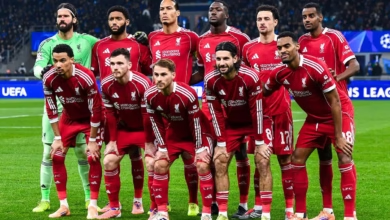Karim Benzema to Arsenal transfer completed if Edu sanctions three moves

The intricate dynamics of Arsenal’s potential pursuit of Karim Benzema have emerged as a compelling narrative in the January transfer window, highlighting the complex intersection of financial regulations, sporting ambition, and squad management in modern football. Mikel Arteta’s candid admission about the possibility of Arsenal conducting no business during this window has shed light on the stringent financial constraints facing Premier League clubs, particularly in the wake of Everton’s severe ten-point deduction for breaching financial regulations.
Arsenal’s striking conundrum has become increasingly apparent throughout the current season, with neither Eddie Nketiah nor Gabriel Jesus managing to consistently deliver the goal returns necessary for a sustained title challenge. This goalscoring deficiency has naturally led to speculation about potential reinforcements, with Benzema’s name emerging as a tantalizing possibility amid reports of his discontent in Saudi Arabia. However, the reality of pursuing such a high-profile signing presents a multifaceted challenge that extends far beyond simple transfer negotiations.
The complexities surrounding a potential Benzema acquisition are numerous and significant. At 36 years old, the former Real Madrid striker represents a short-term solution that would command extraordinary wages, raising questions about the long-term financial wisdom of such a move. Furthermore, there are legitimate concerns about his tactical compatibility with Arteta’s system and the potential impact on the squad’s carefully cultivated dynamics. These considerations become even more pertinent given Benzema’s reported dismissal of exit speculation, as reported by French publication L’Equipe, suggesting that the player himself may not be interested in such a move.
The financial implications of pursuing Benzema would necessitate significant restructuring of Arsenal’s squad, particularly through the sale of players to comply with Premier League financial regulations. This scenario has brought attention to the potential departure of academy graduates, whose sales would represent pure profit from an accounting perspective due to their minimal initial cost to the club. Emile Smith Rowe’s name has already been circulating in transfer discussions, with his limited playing time under Arteta making him a potential candidate for departure.
The situation becomes more complex when considering the broader implications of facilitating such a move. Beyond Smith Rowe, Arsenal might need to consider the sales of other academy products such as Eddie Nketiah and Reiss Nelson, both of whom represent valuable assets on the club’s books. However, the potential departure of these homegrown talents would likely face significant resistance from the fanbase, who have strong emotional connections to players who have progressed through the club’s youth system.
This delicate balance between financial necessity and fan sentiment exemplifies the modern challenges facing football clubs. The only academy graduate seemingly exempt from such considerations is Bukayo Saka, whose exceptional performances and importance to the team’s future make him essentially untouchable in transfer discussions. This exception highlights the complex valuations clubs must make, weighing immediate financial gains against long-term sporting potential and fan engagement.
The broader context of Premier League financial regulations adds another layer of complexity to any potential transfer activity. The recent punishment handed to Everton has served as a stark reminder of the serious consequences of breaching these regulations, making clubs increasingly cautious in their transfer dealings. This regulatory environment forces clubs to be creative in their approach to squad building, often necessitating difficult decisions about player sales to facilitate new acquisitions.
Arsenal’s current situation reflects a broader trend in football where clubs must navigate increasingly complex financial regulations while attempting to maintain competitiveness on the field. The potential necessity of sacrificing young, homegrown talent to facilitate a short-term solution in the form of Benzema presents a challenging dilemma for the club’s decision-makers. This scenario raises questions about the long-term sustainability of such approaches and their impact on club identity and fan connection.
The timing of any potential move adds another dimension to consider. January transfers are traditionally more complicated and often more expensive than their summer counterparts, with selling clubs reluctant to part with key players mid-season without significant compensation. This timing factor, combined with the financial constraints and regulatory considerations, makes the pursuit of a player like Benzema particularly challenging during the winter window.
The impact on squad dynamics must also be carefully considered. Arsenal has worked diligently to build a young, cohesive team with a clear identity and playing style under Arteta. The introduction of a high-profile veteran like Benzema, while potentially beneficial from a purely footballing perspective, could disrupt the careful balance that has been established within the squad. This consideration extends beyond just playing time and tactical adjustments to include factors such as wage structure, leadership dynamics, and long-term squad planning.
The financial aspect of any potential deal would extend beyond just the immediate transfer fee and wages. The Premier League’s Profit and Sustainability Rules require clubs to carefully manage their finances over multiple seasons, meaning any significant expenditure must be viewed through a longer-term lens. The sale of academy graduates might provide immediate financial relief, but could potentially limit the club’s options in future transfer windows and impact their ability to comply with homegrown player requirements.
The situation also raises broader questions about Arsenal’s recruitment strategy and long-term planning. While the need for additional firepower is evident, the pursuit of a 36-year-old striker on high wages would represent a significant departure from the club’s recent focus on younger players with potential resale value. This shift in approach would need to be carefully justified to stakeholders, including fans who have bought into the current project’s emphasis on youth development and sustainable growth.
The potential impact on Arsenal’s academy pathway also merits consideration. The sale of multiple academy graduates to facilitate a short-term signing could send a concerning message about the opportunities available to young players at the club. Arsenal’s academy has long been a source of pride and talent, producing players who have contributed significantly to the first team. Any decisions that might impact this pathway need to be carefully weighed against the potential benefits of immediate reinforcement.
The commercial implications of such a move add another layer of complexity. While Benzema’s arrival would undoubtedly generate excitement and potentially increase commercial revenues in the short term, the long-term impact of selling popular homegrown players must be considered. The connection between fans and local players who have progressed through the academy system often translates into commercial value that might be difficult to replicate with imported talent.
The tactical considerations of integrating Benzema into Arsenal’s system would require careful planning. Arteta’s team has developed a specific style of play that requires high intensity and pressing from all players, including the striker. While Benzema’s technical ability and experience are unquestionable, his ability to maintain the physical demands of Premier League football at 36 would be a legitimate concern.
The opportunity cost of pursuing Benzema must also be evaluated. Committing significant resources to his acquisition and wages could potentially prevent Arsenal from pursuing other targets who might offer better long-term value or better fit the club’s strategic vision. This consideration becomes particularly relevant when considering the club’s need to strengthen other areas of the squad in future transfer windows.
Fan sentiment plays a crucial role in any major transfer decision. While the arrival of a Ballon d’Or winner would undoubtedly generate excitement, the potential departure of beloved academy graduates could create significant backlash. The club’s decision-makers must weigh these emotional factors alongside the technical and financial considerations, recognizing that fan support and engagement are crucial components of long-term success.
The precedent set by such a move could also impact future transfer negotiations and squad planning. If Arsenal were to sanction the sale of multiple academy graduates to facilitate one signing, it could influence how other clubs approach negotiations with Arsenal and how future academy prospects view their pathway to the first team.
The regulatory environment in football continues to evolve, with increasing scrutiny on financial compliance and sustainability. Any major transfer decisions must be made with an eye toward future regulatory changes and their potential impact on the club’s ability to operate effectively in the transfer market.
The experience of other clubs who have made similar decisions can provide valuable insights. There are numerous examples of clubs who have sacrificed long-term development for short-term gains, often with mixed results. Arsenal’s decision-makers would need to carefully study these cases to avoid potential pitfalls and ensure any major moves align with the club’s long-term interests.
In conclusion, while the potential acquisition of Karim Benzema represents an intriguing possibility for Arsenal, the complexities and implications of such a move extend far beyond simple transfer negotiations. The necessity of potentially sacrificing multiple academy graduates, combined with financial regulations, squad dynamics, and long-term strategic considerations, makes this a particularly challenging decision for the club’s management. The situation exemplifies the modern challenges facing football clubs as they attempt to balance sporting ambition with financial sustainability and maintain strong connections with their fanbase. As the January window progresses, Arsenal’s approach to this situation will likely provide significant insights into their long-term strategy and priorities.















